Foundation Pathway
At Riverside, we understand that the quality of education a pupil receives in the Early Years, lays the foundations for pupils to Be All That They Can Be and to create a love of learning that will grow throughout their life. Our curriculum is supported and underpinned by the 5 areas of engagement. The 5 areas of engagement are:

- Exploration – Identifying pupil interests to increase motivation.
- Realisation – Observing how a pupil reacts to new stimulus.
- Anticipation – Developing pupil understanding of cause and effect.
- Persistence – Maintaining an activity long enough to achieve a desired outcome.
- Initiation – Developing pupil independence.
Embedding these 5 areas as a focus within our curriculum allows our teachers to make learning truly irresistible, whilst focusing on providing our pupils with the necessary skills that they need to be curious about the world around them.
We are delighted to be able to work with our families to personalise our pupils’ curriculums to ensure that they are unique and truly meaningful to each child and their family. EHCP Outcomes remain a central focus and, throughout the year, each pupil receives two Personalised Learning Plans (PLPs), which break the EHCP outcomes into smaller and more focused areas of learning. Staff use the first term to observe and build relationships with pupils, ensuring that their Happiness Passport is an accurate reflection and celebration of who they are and that it identifies the best strategies to support them to be at their optimum level for learning.
Alongside this, we follow the Statutory Early Years Framework and Development Matters, meaning that every child will access learning that includes Physical Development, Personal, Social and Emotional Development, Literacy, Mathematics, Understanding the World and Expressive Arts and Design. These areas of the curriculum are all met through structured and unstructured learning time. Most importantly, we know the importance of giving all of our pupils a meaningful and effective communication method.
We ensure that Communication and Language activities are weaved into all areas of our curriculum. We provide a ‘Total Communication’ approach, and ensure all methods of communication are used to support our pupils to share and develop their voice. This is through AACs, vocalisations, gestures, signing, PECS, Makaton, communication books and many other ways.
We are creative with our approach, and ensure that all seven areas of the Early Years Curriculum are featured within our offer in a meaningful way, taking into account and responding to our pupils’ personalised needs and learning styles. By incorporating all 7 areas we are widening our pupils’ worlds and providing them with a variety of rich learning opportunities and subject areas.
 Our Foundation curriculum is underpinned by Development Matters (2023) and the 7 areas of learning, which are broken down into Prime and Specific areas:
Our Foundation curriculum is underpinned by Development Matters (2023) and the 7 areas of learning, which are broken down into Prime and Specific areas:
Prime areas: Communication and Language, Physical Development and Personal, Social and Emotional Development.
Specific areas: Literacy, Maths, Understanding the World and Expressive Arts and Design.
Every pupil will access these 7 areas of learning alongside their Personalised Learning Plan, which has been linked to their EHCP.
All areas are taught in at least 1 discrete session per week, with additional cross-curricular learning opportunities occurring throughout the day, as part of our holistic approach. Communication and Language is weaved into all aspects of our pupils’ day in a way that is unique and personalised to each pupil.
Free-flow learning takes place in each class for the first hour of the day. This is tailored to each class and pupils' needs, considering their sensory and communication needs alongside their developmental stage linked to Development Matters. Our free-flow approach is topic based, allowing pupils to be immersed in their topic-based learning, which is also linked to key texts. The activities provided remain consistent for at least one week to ensure pupils build confidence to explore ideas, retain knowledge and build upon previous learning. We know for our pupils that repetition is key for any deep and meaningful learning to occur and skills to be built.
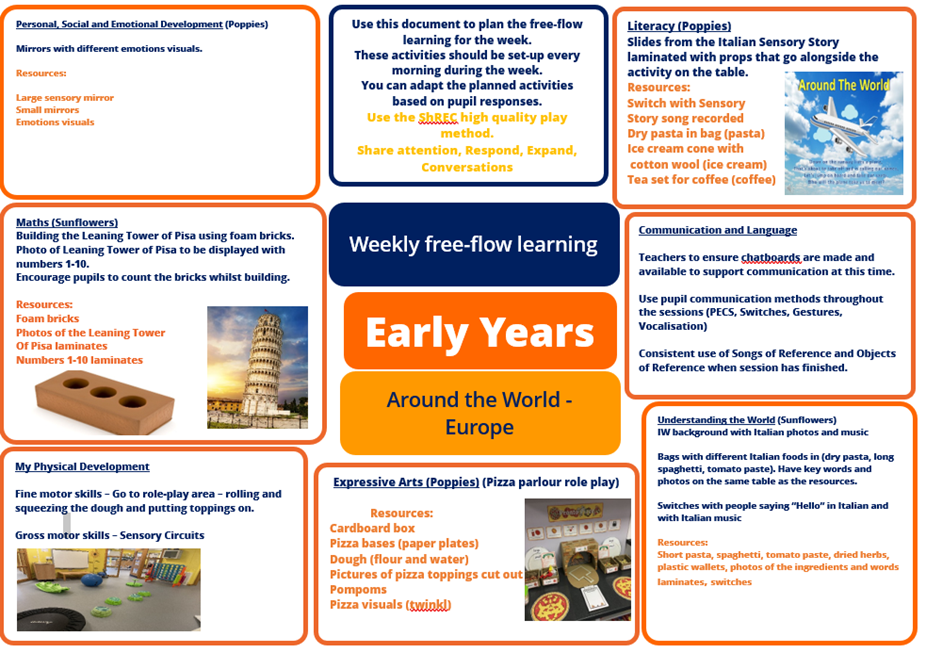
Schema Play
Our pupils have many opportunities to learn through play in the Early Years Phase and our teachers ensure that play is a key part of the curriculum. Pupils are immersed in topic-based learning by accessing activities that meet all seven areas of the curriculum during free-flow learning time. Pupils are the leaders of their own learning and have the opportunity to familiarise and master the different activities available to them. Our Early Years team use the Assess, Plan, Do, Review cycle, to adapt activities based on our pupils’ responses.
Our staff have access to Professional Development opportunities linked to Early Years research and theories. To support pupils with their play skills, we have ensured that Schema Play is at the heart of our play curriculum. Schema Play identifies 9 schemas that children may display when they are exploring the world around them. The schemas are:
- Trajectory
- Transporting
- Rotational
- Enclosing
- Enveloping
- Orientation
- Connecting
- Transforming
- Positioning
The Early Years team’s in-depth knowledge of Schema-Play allows them to identify pupils’ dominant play schemas and unique lines of enquiry. Staff use this knowledge to seed the environment around them and plan engaging and motivating learning activities during free-flow and structured learning time.
Staff use knowledge of play schemas to support pupils in free-flow learning and to support engagement in sessions. Our staff can use specialist planning documents linked to Schema Play such as below, and talk to our Schema Play specialists to support sequencing in our pupils’ journeys.
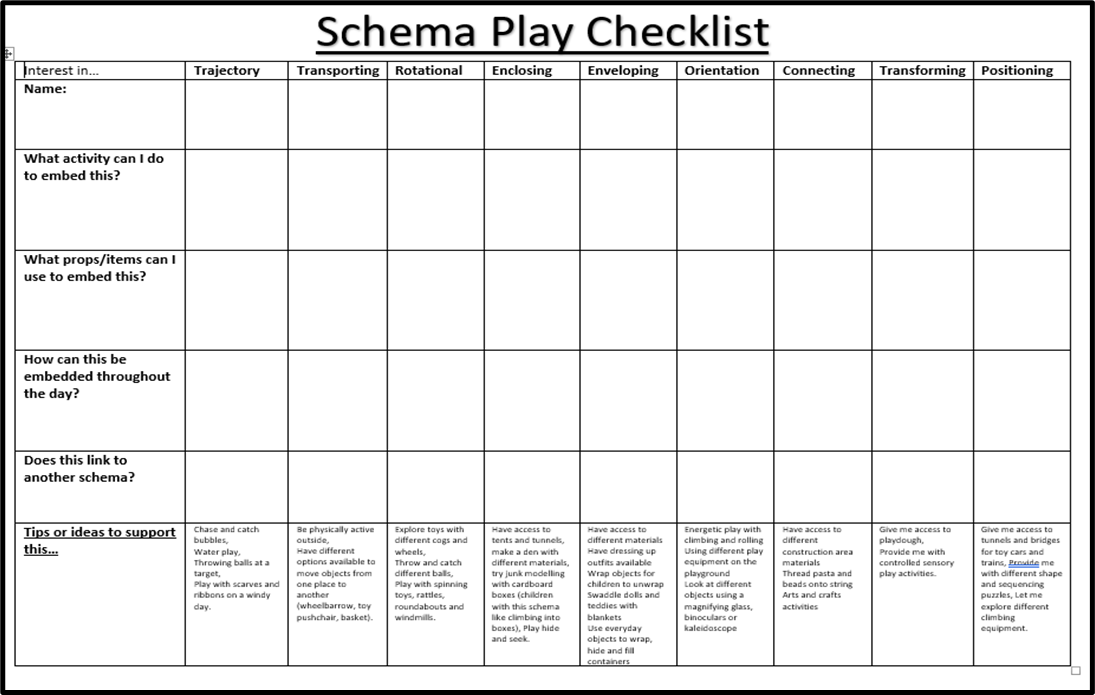
Our staff understand the importance of high-quality play interactions, and in order to support our pupils’ play skills we incorporate the ShREC model:

This model enables supporting adults to share pupils' play opportunities and match their responses based on their SCERTS partner stage. This means that pupils are always the leaders of their play and supporting adults are skilled in knowing when and how to interact with them in meaningful ways, extending their communication and reciprocal play skills.
Planning
Curriculum grid – teachers complete the curriculum grid for each term and topic and note what statements from Development Matters sessions will be focusing on. This may be one statement per curriculum area or several dependent on pupils in their class and what is right for pupils in their developmental stage and sequence of learning.
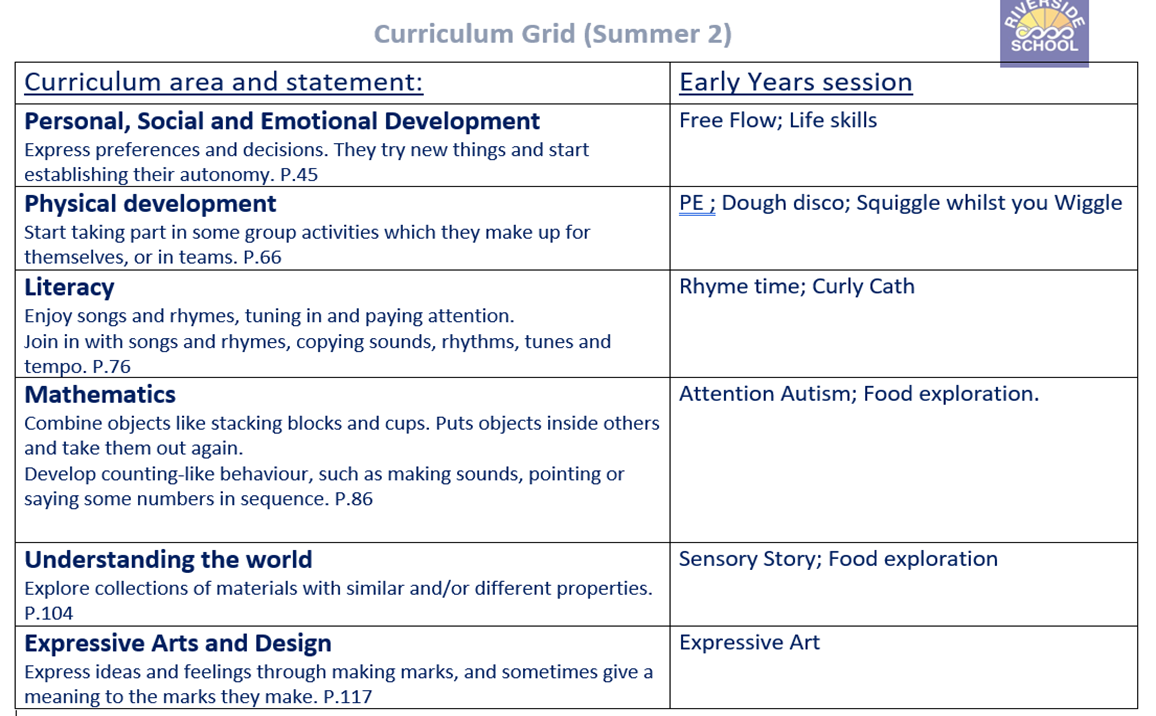
Lesson plans
Lesson plans are required for Personal, Social and Emotional Development, Physical Development, Literacy, Mathematics, Understanding the World and Expressive Arts and Design. The plans are based around a simple outline of the activity planned and is focused on sequencing and development of learning through the ‘Assess, Plan, Do, Review’ cycle and will be completed termly. These will very often include a free-flow element after structured learning.
The activity is broken down into 2 or 3 weekly chunks as we know that repetition is key to supporting our pupils to have the opportunity to master the knowledge and skills being taught.
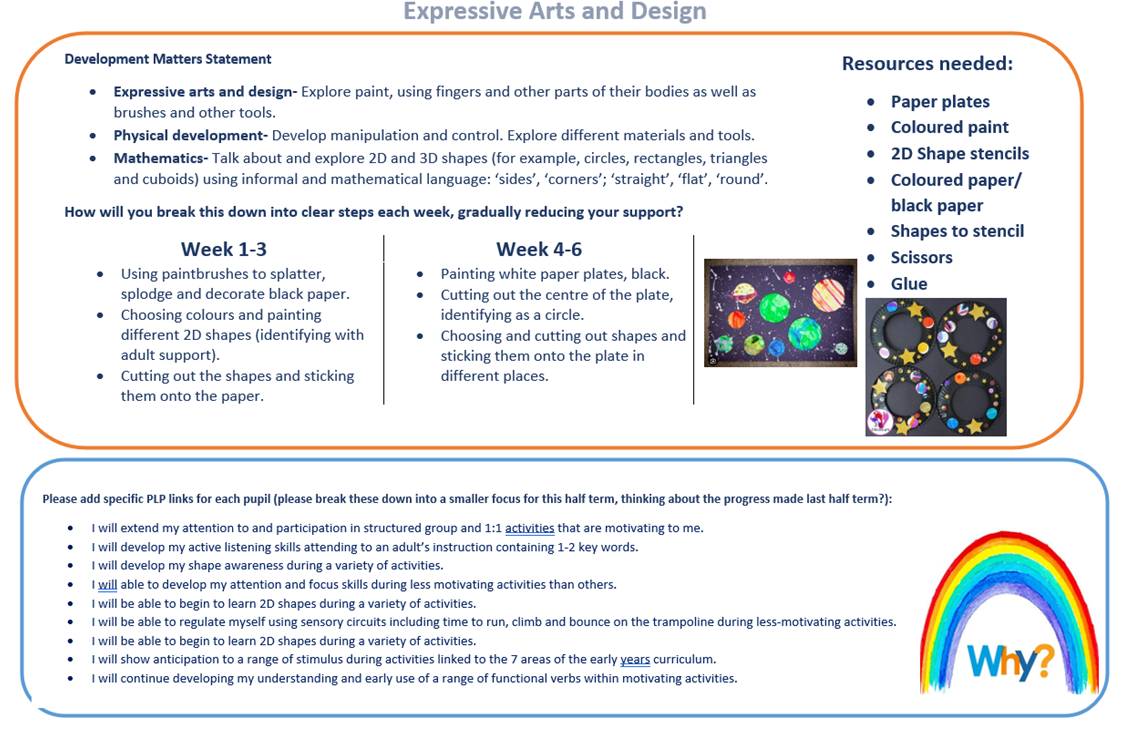
Staff in each class will reflect on the session that has taken place weekly. The reflections note any small steps of progress that pupils have made and any support that pupils require, for example, hand over hand support. The reflections link to the Development Matters statements, broken down PLP targets and the Engagement Model. Through this reflection process, staff identify any barriers to pupils’ learning and note any changes they will make to the next session, ensuring a clear sequence of learning in the curriculum area for each pupil. This can be for the session in general or specific to individual pupils. This is a collaborative process for teachers and teaching assistants to be involved in.
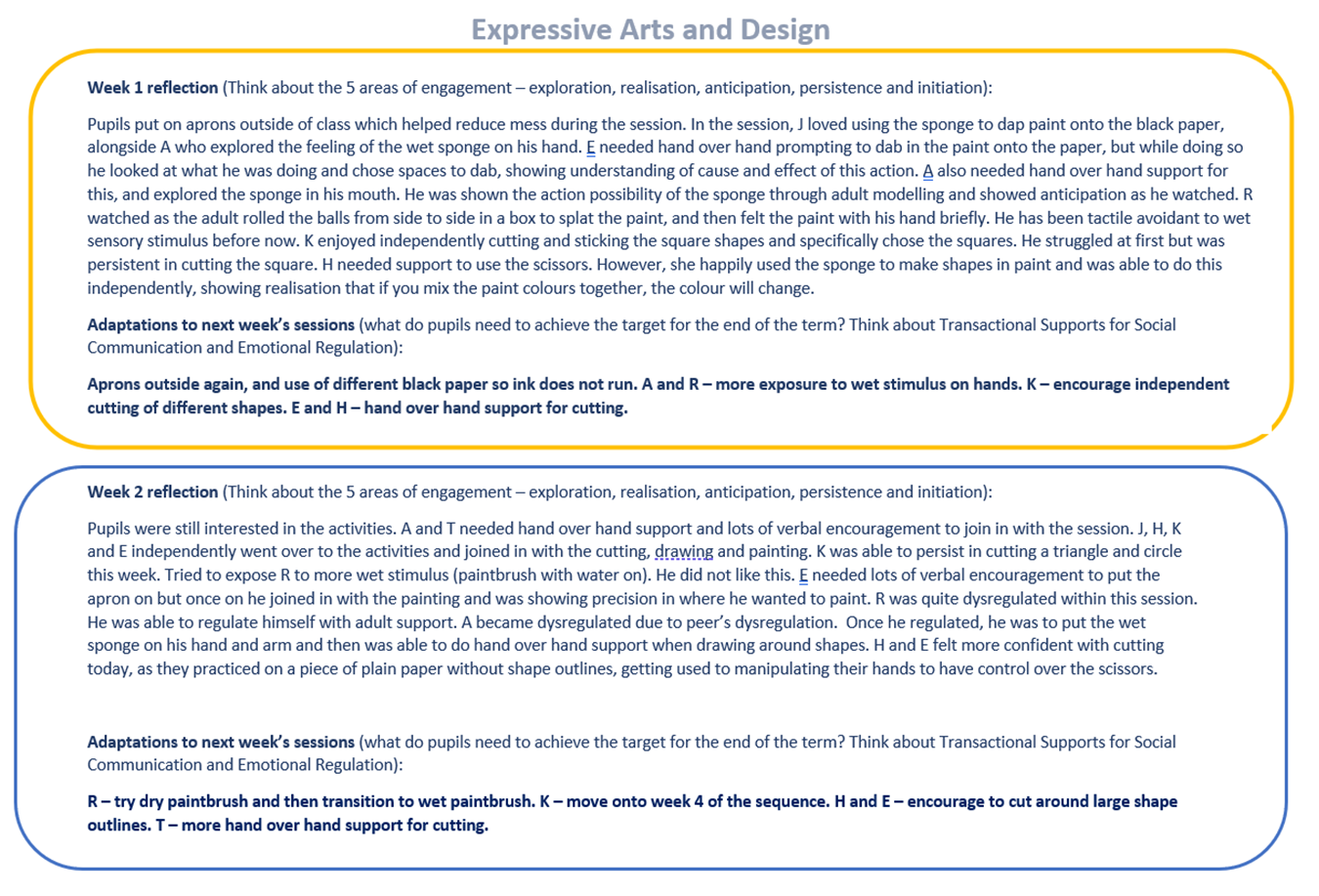
At the end of each half-term, teachers will add in what each pupil has achieved in this session. From this reflection, they will either plan a new session based on the progress pupils have made or continue with the current session ensuring pupils are making small steps of progress to achieving the Development Matters target and broken down PLP target. In both of these scenarios, a clear sequence of learning matched to pupils’ stage of learning and progress already made is identified.
Pupils in the nursery will receive a Unique Profile linked to the 7 areas of learning and the 3 areas of the characteristics of effective learning in Development Matters. Using this allows us to get to know our nursery pupils so that we can write accurate Personalised Learning Plans when they are full time pupils in Reception. All other pupils will receive a Unique Profile linked to their Personalised Learning Plan and the Engagement Areas. All Early Years pupils will have an Early Years profile at the end of each academic year.
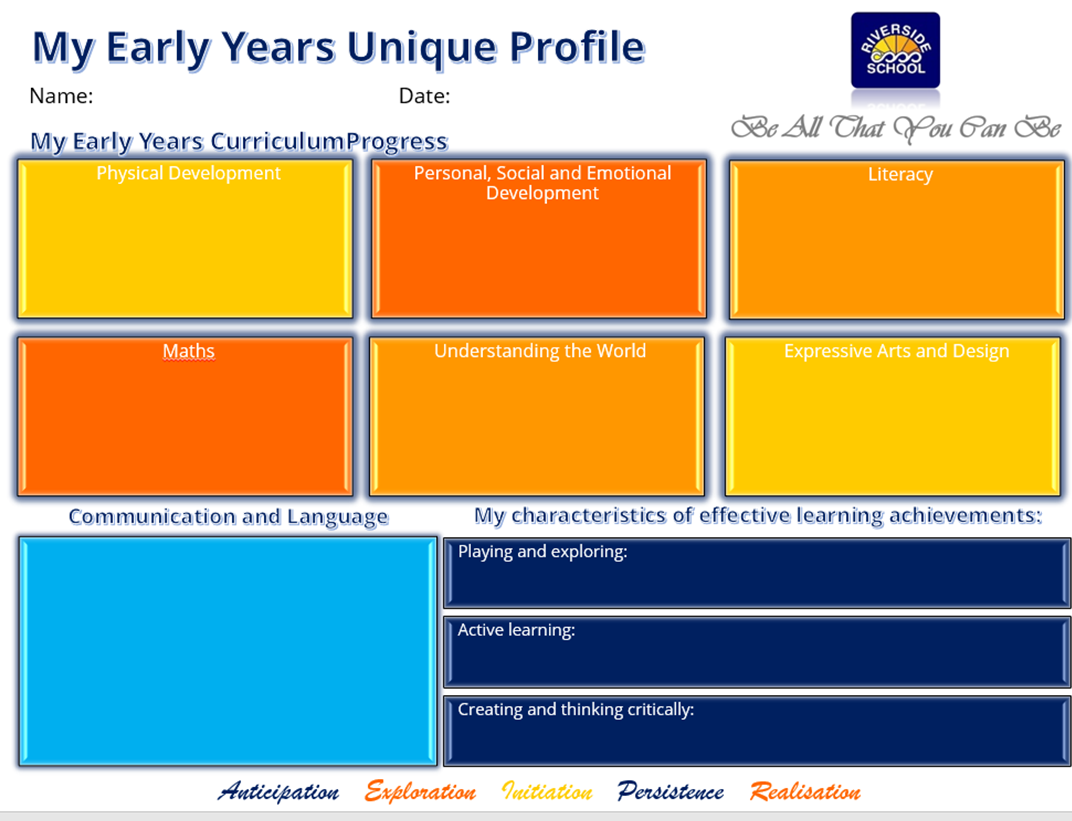 We value every pupil at Riverside for the unique person that they are and we ensure that our responsive environments reflect this. Accessing the Early Years Curriculum at Riverside School means that every pupil is given a solid foundation in their first years at school to build upon their interests and develop secure attachment and positive relationships with their peers and supporting adults, enabling them to be at their optimum level of readiness for the next stage of their learning journey.
We value every pupil at Riverside for the unique person that they are and we ensure that our responsive environments reflect this. Accessing the Early Years Curriculum at Riverside School means that every pupil is given a solid foundation in their first years at school to build upon their interests and develop secure attachment and positive relationships with their peers and supporting adults, enabling them to be at their optimum level of readiness for the next stage of their learning journey.








